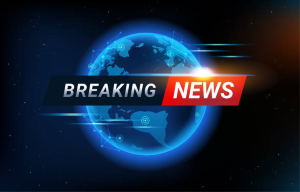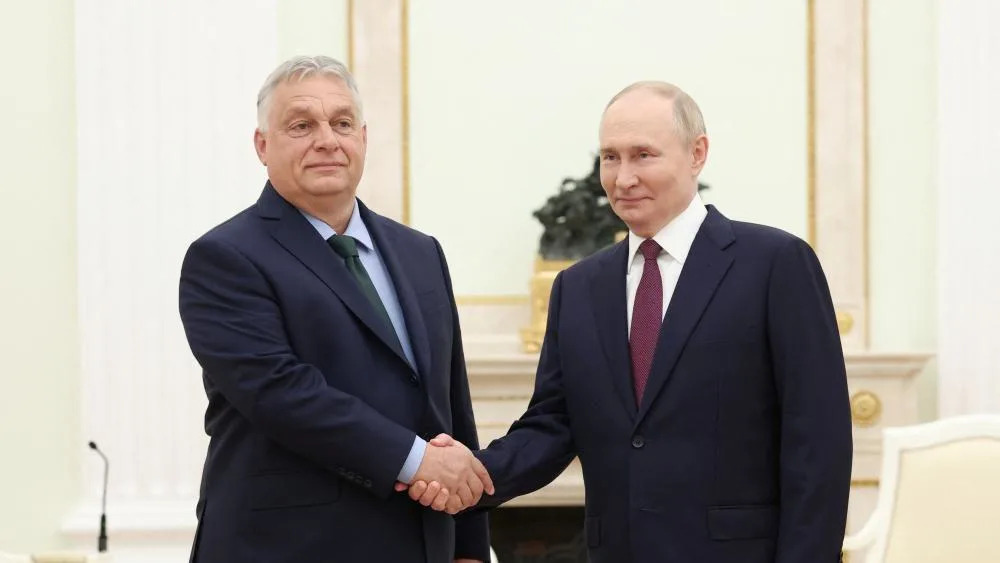Hungarian Prime Minister Viktor Orban met with Russian President Vladimir Putin.
The European Union has stripped Hungary of the right to host the next meeting of foreign and defence ministers over its stance on the war in Ukraine.
It comes weeks after Hungary assumed the presidency of the Council of the European Union, a role in which it would normally host the event, and amid anger over a meeting Prime Minister Viktor Orban held with Russian President Vladimir Putin in Moscow earlier this month.
The EU's foreign policy chief, Josep Borrell, said Hungary's actions should have consequences and that "we have to send a signal, even if it is a symbolic signal".
Hungary described the move as "completely childish".
Every six months, under each new council presidency, the EU's foreign and defence ministers hold informal meetings to discuss the biggest global issues facing the bloc.
The next set of meetings will take place on 28-30 August and were to be held in Budapest, but on Monday Mr Borrell announced they would instead take place in Brussels.
Citing comments made after the meeting with Mr Putin in which Mr Orban accused the EU of having a "pro-war policy", Mr Borrell told reporters: "If you want to talk about the war party, talk about Putin.
"I can say that all member states - with one single exception - are very much critical about this behaviour.
"I think it was... appropriate to show this feeling and to call for the next foreign and defence council meetings in Brussels."
Of the 26 other countries in the EU, only Slovakia has backed Hungary in the dispute.
Following the decision, Hungarian Foreign Minister Peter Szijjarto wrote on Facebook: "What a fantastic response they have come up with.
"I don't want to hurt anyone's feelings, but it feels like being in a kindergarten."
Mr Orban's meeting with Mr Putin came as part of what he described as a "peace mission" - launched days after Hungary assumed the council presidency - that also saw him visiting the leaders of Ukraine and China as well as Republican presidential candidate Donald Trump in the US.
The trip sparked condemnation from leaders across the EU, with European Commission chief Ursula von der Leyen describing it as "nothing but an appeasement mission".
Finnish Prime Minister Petteri Orpo said Mr Orban had "no mandate to negotiate or discuss on behalf of the EU", while Swedish Prime Minister Ulf Kristersson said the trip sent "the wrong signal to the outside world and is an insult to the Ukrainian people’s fight for their freedom".
The episode is one of numerous occasions since Russia launched its full-scale invasion of Ukraine on which Hungary has been at odds with most of the rest of the EU about the appropriate response.
After winning re-election in April 2022, just months after the invasion, Mr Orban told a crowd of supporters that Ukrainian President Volodymyr Zelensky was among the people he would have to "battle" in his fourth term.
Last year, he repeatedly used Hungary's veto to delay a €50bn (£42bn) package of non-military financial aid to Ukraine.
AfriPrime App link: FREE to download...
https://www.amazon.com/Africircle-AfriPrime/dp/B0D2M3F2JT
Borrell accuses Orbán of disloyalty and joins boycott against Hungary's EU presidency
Josep Borrell delivered on Monday a blistering rebuke against Viktor Orbán and his self-described "peace mission," which saw the Hungarian premier travel to Moscow and meet with Vladimir Putin to discuss possible ways to end the war in Ukraine.
The tour, which also featured an equally controversial stop in Beijing to meet Xi Jinping, took place earlier this month, coinciding with the start of Hungary's six-month presidency of the Council of the EU, but continues to send shockwaves across the bloc.
"Russia is the aggressor in violation of the United Nations Charter and Ukraine, the victim, exercising its fundamental rights to self-defence and there's nothing of hysteria about that, it's just telling the truth," Borrell said after a meeting of EU foreign ministers.
"Any so-called 'peace mission" that ignores these basic fundamentals is, at the end of the day, only benefitting Putin and will not bring peace."
The High Representative insisted that Hungary, as a member state, was bound by Article 24.3 of the EU Treaties, which posits all countries must support the bloc's foreign policy "actively and unreservedly in a spirit of loyalty and mutual solidarity."
The article, he said, is neither "decoration" nor "empty words."
"Each member state is sovereign on its foreign policy – true. But as far as they're members of this club, they have to obey (with) the treaties," Borrell said. Complying with this obligation "is not something you can do or not – you have to."
Asked if Orbán's actions amounted to a breach of the article, he replied: "For me, it's clear what has happened belongs to the realm of a lack of loyal cooperation."
'Purely shameful'
Following days of mounting speculation, Borrell confirmed the informal meeting of foreign ministers, known as Gymnich, that was originally scheduled to take place in Budapest at the end of August would instead be hosted in Brussels. The switch adds to the boycott already announced by the European Commission, which consists of sending civil servants, rather than Commissioners, to informal meetings in Hungary.
Formal meetings of the EU Council are spared as their organisation does not depend on the rotating presidency's holder.
Borrell took particular issue with the claims made publicly by Orbán and his foreign minister, Peter Szijjártó. Both have repeatedly complained about the bloc's continued supplies of weapons and ammunition to Kyiv, disparaging this as a "pro-war policy."
"The only one who's pro-war is Putin, who is calling for the Ukraine partition and rendition as pre-conditions for any talks and any ceasefire," Borrell said.
"If you want to talk about the 'war party,' talk about Putin. Not about the European Union."
Throughout the press conference on Monday evening, Borrell refused to use the word "boycott" to describe his decision and insisted the Hungarian representative would nevertheless be invited to the Gymnich meeting in Brussels.
"We have to send a signal, even if it's a symbolic signal, that being against the foreign policy of the European Union and disqualifying the policy of the European Union as the 'party of war' has to have consequences," he added, noting the strong criticism labeled at Orbán's actions had been echoed by 25 members states with "one single exception," widely considered to be Slovakia, which shares Budapest's viewpoint.
The foreign policy chief took the opportunity to denounce, once again, Hungary's perennial veto of the bloc's military assistance for Ukraine, which currently affects €6.6 billion in reimbursements.
"Member states insisted that this was something unacceptable and terrible, but unhappily, the situation of blockage remains," he said.
Borrell admitted he had "lost the hope" that Budapest would soon change its mind and warned the absence of reimbursements could disincentivise some capitals from providing Kyiv with further military assistance.
"Today I said: this is shameful," he said. "Purely shameful."
AfriPrime App link: FREE to download...
https://www.amazon.com/Africircle-AfriPrime/dp/B0D2M3F2JT
EU moves high-level meetings out of Budapest to protest Orbán’s Ukraine war stance
The European Union’s next meetings of foreign and defense ministers scheduled in August will be moved from Budapest to Brussels, the bloc’s top diplomat announced Monday, in the latest escalation of a spat between the union and Hungary over its prime minister’s stance on the war in Ukraine.
Hungary’s far-right Prime Minister Viktor Orbán has ruffled feathers among EU leaders by claiming recently that the union has a “pro-war policy.”
Borrell responded to Orban’s comment during a press conference in Brussels, saying, “I understood that we have to send a signal, even if it is a symbolic signal, that being against the foreign policy of the European Union and disqualifying the policy of the European Union as the ‘party of war’ has to have some consequences.”
“We analyzed the statements and the actions implemented” by the Hungarian prime minister and foreign minister, the chief diplomat of the EU said. “I can say that all member states, with one single exception, were very much critical about this behavior,” he added.
“European Union policy is not a pro-war policy. We strongly rejected that,” Borrel said, adding, “the only one who is pro-war is Putin.”
The informal EU Council meetings of foreign and defense ministers were due to take place in Budapest from August 28 to 30, according to the EU council website, with Hungary currently holding the rotating European Union presidency.
Borrell’s decision comes after European Council President Charles Michel firmly hit back at Orbán’s claim that the EU has led a “pro-war policy” in a letter published last week.
“Russia is the aggressor and Ukraine is the victim exercising its legitimate right to self-defense. Russia is leading a war of aggression in blatant violation of international law, Ukraine’s territorial integrity and sovereignty in accordance with the UN Charter,” Michel wrote.
Orbán further upset EU lawmakers with his recent so-called “peace missions” at the beginning of July – meeting Russian President Vladimir Putin in Moscow, Chinese leader Xi Jinping in Beijing, and most recently former US President Donald Trump at his Mar-a-Lago residence in Florida.
The authoritarian Hungarian leader has sought to cast himself as a peacemaker in the Ukraine conflict, but his stance is at odds with most EU leaders, who have pledged unequivocal support for Ukraine as it attempts to repel Russia’s military effort.
In his letter to those leaders, Orban said that during the meetings there was a “general observation” that “the intensity of the military conflict” in Ukraine “will radically escalate in the near future.”
A letter signed by over 63 European lawmakers, addressed to the three EU chiefs, said Orban had “caused significant damage” through his meetings. They called on the bloc’s leaders to suspend Hungary’s voting rights in the European Council, arguing that “mere verbal condemnation” of Hungary has “no effect.”
European Commission President Ursula von der Leyen later slammed the Hungarian prime minister’s visit to Moscow as an “appeasement mission.” In response, Orbán told CNN he was simply fulfilling his “Christian duty” by visiting Putin.
“If you have a position and you can have an impact on bad things to improve it, you have to do so,” Orban told CNN last week.
AfriPrime App link: FREE to download...





